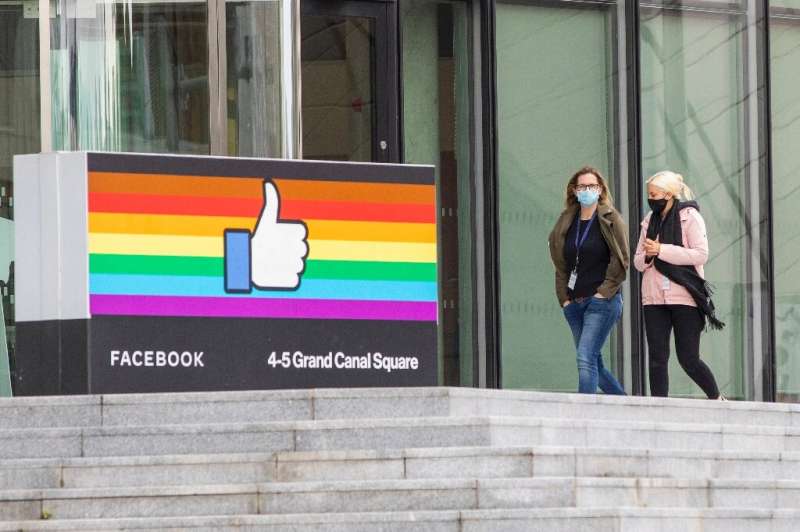Irish tech sector weighs up implications of global tax plan
The day after Ireland backed plans for a minimum global corporation tax of 15 percent, tech firms lured to the Republic by its historically low levy are waking up to the possibility that their situation might now change radically.
“Ireland has long sold stability and certainty of its regime as being an attractive feature for foreign investments,” economics lecturer Seamus Coffey, from University College Cork, told AFP.
“I don’t think such stability and certainty can be considered to be as reliable now.”
On Thursday, finance minister Paschal Donohoe said Ireland had relented its holdout against global tax reform efforts helmed by the Paris-based Organisation for Economic Co-operation and Development (OECD).
The scheme aims to stop multinationals cutting tax bills by setting up bases in nations with low rates.
Since 2003, Ireland has taxed corporations at a rate of 12.5 percent.
While that has drawn accusations that the country is a tax haven, Dublin insists that the low levy is key to attracting foreign investment and jobs.
Coffey said an increase in corporation tax of 2.5 percentage points will not lead to an exodus of employers from Ireland over the short or medium term.
But the manner in which Ireland was strong-armed into change by the OECD and G7 nations may stick in the mind of employers considering Ireland as a new prospect in the longer term.

“The significance of Ireland’s corporate tax rate being changed as a result of outside, external influences… shouldn’t be discounted,” he said.
“The pipeline of investments may not be as readily available as it was in the past.”
Tax ‘brand’
Facebook, Google and Apple all maintain large offices in Ireland.
The digital sector accounts for 13 percent of the country’s gross domestic product and employs 210,000, according to industry lobby group Technology Ireland.
The tech boom is most starkly visible in Dublin where the “Silicon Docks” host metal and glass office hubs for Google and Facebook, towering over the capital’s skyline.
Government investment agency IDA Ireland said the country “has become the global technology hub of choice when it comes to attracting the strategic business activities of ICT companies”.
In a country of just five million, the 12.5 percent rate has been a key draw.

“The importance of the 12.5 percent now is really that it’s known worldwide by anybody with an interest in this area,” said Trinity College Dublin professor Frank Barry.
“It has become almost a brand now, so that’s the main problem in changing it,” he said.
There are also suggestions that removing Ireland’s tax advantage would cede ground to larger and more populous economies capable of outmatching it on a level playing field.
Two pillars
But Ireland siding with a majority of nations on the tax deal has also given firms the certainty they have long craved for.
Donohoe said Dublin won a key concession in the OECD draft deal, to remove a clause about a minimum rate of “at least” 15 percent that would have left the door open to further rises and made investors skittish.
“It is a sensible and pragmatic decision made by the government in the interests of our country,” he told reporters on Thursday.
“The fact that we are closer to that elusive certainty and stability has definitely been welcomed by clients,” EY Ireland tax partner Joe Bollard said.

“The fact that Ireland is seen as a positive stakeholder in that respect is also playing well with investors.”
Crucially, the OECD pact also contains proposals to levy corporate profits in the nations where they operate, rather than where they choose to be based.
That would have far-reaching implications for digital firms, and would undermine the business argument for leaving Ireland for different shores.
Barry said that beyond the damage to Ireland’s “brand name” as a low-tax nation, he was “sanguine” about the nation’s prospects for courting tech talent and investment.
“The big countries… want to get their hands on the tax revenue,” he said.
“Even though it collects a vast amount in corporation tax, Ireland has always been more concerned with the employment implications.”
France, Germany push for ‘historic agreement’ on global corporate tax rate
© 2021 AFP
Citation:
Irish tech sector weighs up implications of global tax plan (2021, October 8)
retrieved 8 October 2021
from https://techxplore.com/news/2021-10-irish-tech-sector-implications-global.html
This document is subject to copyright. Apart from any fair dealing for the purpose of private study or research, no
part may be reproduced without the written permission. The content is provided for information purposes only.
For all the latest Technology News Click Here
For the latest news and updates, follow us on Google News.
